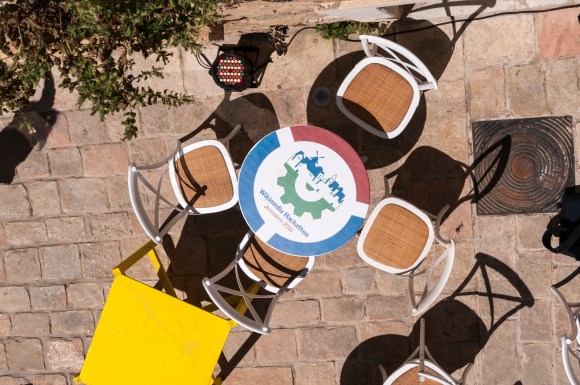
If you’ve attended a hackathon in the Wikimedia movement, you’ve likely encountered Rachel Farrand. Farrand, who has been working at the Wikimedia Foundation since 2011, helps ensure that technical events run smoothly—and that participants are well-versed in what to expect when they show up to code. We checked in with Rachel to learn more about the recently launched mentoring program, and to find out what her team learned in Montreal that will be applied to future events.
You’ve run a lot of hackathons. And yet, every time you run a new event, you change up some things. I’m wondering how you assess what to change, and where you focused your efforts during the Wikimania Hackathon?
Rachel Farrand: After every hackathon we collect feedback from participants and make changes to areas of our events that are not running as smoothly as the other areas. We also make changes based on our Wikimedia Foundation Technical Collaboration Team goals. For example right now we are trying to relate everything we do back to “onboarding and supporting new volunteer developers”. So our mentoring program and sessions for newcomers always get a lot of extra attention. (Related: What we learned by making both newcomers and experienced participants feel connected and engaged at the Vienna Hackathon.)
You mention that you changed the mentoring program this year. Can you talk a little bit more about how that program works?
Rachel Ferrand: Our mentoring program works to connect projects with a mentor and then with a newcomer or group of newcomers. Mentors are welcome to either come with their own project or be matched with one. One of the main changes for the Montreal hackathon was to pre-match mentors and projects with newcomers in advance of the hackathon so that they could begin to get to know each other and work in advance so they could start hacking right away when they arrived in Montreal. We spent the first morning giving newcomers an overview of Wikimedia tech and explaining their options so that choosing a project would be easier.
We also tried to simplify the mentoring program and incorporate it into the rest of the hackathon so that there would be more hacking time and so that newcomers could more easily meet other Wikimedia Developers who were not involved in the mentoring program. We did this by reducing the number of required meetings for both mentors and newcomers and moving the mentoring program from a separate room into a corner of the main hacking space.
Finally we gave a bit more structure to the mentor preparation by giving them time to create a “project poster” in advance of meeting with the newcomers and giving them an orientation as to how they could be effective and get help throughout the hackathon while the newcomers were getting the orientation to Wikimedia Tech.
What kinds of projects did people work on at this event?
Rachel Farrand: Here’s the list of the tasks from the event, and here’s the list of projects & notes about them from the showcase and the showcase video.
This year three volunteers from the Vienna Hackathon were sponsored to attend the Wikimania Hackathon and Wikimania. How did this come about? How do participants benefit from this kind of continuity?
Rachel Farrand: The Wikimedia technical community, just like the editing community, has volunteers at its core. We have noticed that attending events and making real connections with real people can inspire newcomers to stay around and become more involved. We choose three volunteers who attended the Vienna hackathon as “newcomers” to our technical spaces who did a lot of good work and could continue their work in Montreal, where they would meet an even larger and different part of our technical community. The people we choose were recommended by mentors, other community members, and Wikimedia Austria. We believe that the more positive personal connections a newcomer makes the more likely they will be to want to stay involved and we believe that in-person events really facilitate these connections. (Note: You can read an interview with two of the attendees.)
What changes are you thinking about for the next hackathon you put on?
Rachel Farrand:
- We want to find more ways for people to help newcomers and for newcomers to feel comfortable and welcome. Some mentors want to commit to helping newcomers for the entire event but others may want to work on their own projects but spend only a few hours helping newcomers. Creating more pathways and options for helping will hopefully also work for newcomers with different needs.
- We want to provide more documentation and support for mentors on how to be an effective mentor, how to prepare, how to communicate effectively, and when and how to get additional help for their newcomers.
- We plan on having a much more extensive, clear, and diverse set of projects pre-matched with mentors and documented in advance of the hackathon. We also plan on having more small and easy tasks for newcomers to complete who are just learning about development.
- We plan to continue to try and find new ways to engage our newcomers both in advance of the hackathons and after the hackathons are over. To provide support and community to them throughout the year. (Also see the Open Leaders Project)
Is there anything else you’d like to add?
Rachel Farrand: We have two more international hackathons coming up in 2018: One in Barcelona and on in Cape Town, South Africa. There are scholarship programs for both events, and anybody interested in getting involved in any area of Wikimedia tech is welcome to attend.
Interview by Melody Kramer, Senior Audience Development Manager, Communications
Wikimedia Foundation

Can you help us translate this article?
In order for this article to reach as many people as possible we would like your help. Can you translate this article to get the message out?
Start translation